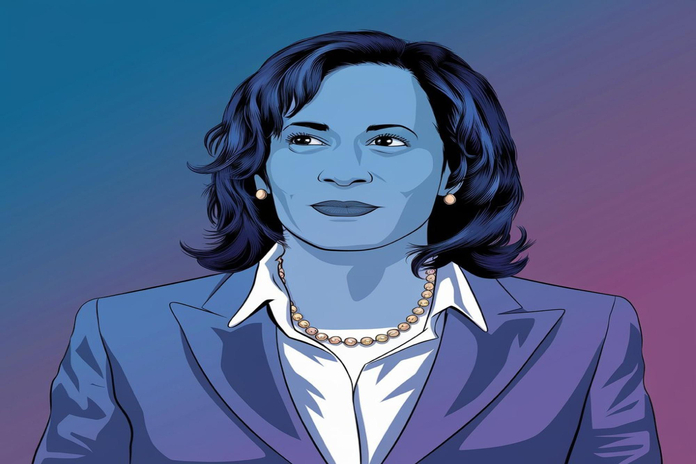Chris Larsen, co-founder and executive director of Ripple Labs, has joined a group of 88 business leaders who are supporting Vice President Kamala Harris in the 2024 U.S. presidential election. The move highlights potential divisions among industry leaders, particularly when it comes to political support within the crypto space. Larsen’s decision to support Harris contrasts with the more conservative stance of other prominent figures in the crypto space, including Ripple CEO Brad Garlinghouse.
Ripple’s Political Support and Corporate Influence
Larsen’s endorsement of Kamala Harris reflects a broader trend of corporate leaders publicly supporting political candidates whose interests align with theirs. A letter signed by Larsen and executives from companies like Yelp, Box, and Snapchat expressed support for Harris, citing her commitment to “fair and predictable policies that support the rule of law, stability, and a sound business environment.” These corporate endorsements reflect a growing focus on shaping the regulatory environment for digital assets.
Ripple’s political support has largely been strategic, targeting candidates perceived as crypto-friendly. Ripple has donated about $48 million to pro-crypto super political action committees like Fairshake, but the company’s overall political giving has shown a willingness to work with both sides of the political aisle.
Ripple’s Complex Political Bias
Despite Larsen’s support for Harris, Ripple’s extensive political activity suggests the company is considering both sides of the aisle. Ripple and its CEO Brad Garlinghouse have made significant contributions to pro-crypto Republicans, most notably targeting Senator Elizabeth Warren, a crypto critic. Garlinghouse personally donated $50,000 to a super PAC that aims to secure a Republican majority in the U.S. Senate. This support for Republican causes seems to contrast with Larsen’s support for Harris and her Democratic platform, and illustrates the complex dynamics of Ripple’s political strategy.
While Garlinghouse’s contributions are aligned with efforts to counter regulatory critics like Warren, his political support for Ripple has also come from the Democratic Party, particularly those who are seen as more supportive of the growth of the cryptocurrency industry.
The fight over cryptocurrency regulation
Ripple has been at the center of a long-running legal battle with the U.S. Securities and Exchange Commission, which accused Ripple of violating securities laws in its XRP token sale. The case is one of the most notable legal battles shaping how cryptocurrencies will be regulated in the United States. Many in the industry see SEC Chairman Gary Gensler’s stance on cryptocurrencies as being in line with Warren’s, creating friction between Ripple and regulators.
Ripple’s political activities, including its support for Kamala Harris and its support of bipartisan PACs, reflect Ripple’s desire to create a more favorable regulatory environment for digital assets. By supporting candidates who are more open to cryptocurrencies, Ripple hopes to gain momentum in its efforts to shape policy and reduce regulatory oversight.
Kamala Harris and the Crypto Sector
While former President Donald Trump has explicitly embraced cryptocurrencies during his campaign and pledged to make the U.S. the “crypto capital of the world” if re-elected, Kamala Harris has been more reserved in her public statements about digital assets. However, her campaign has shown signs of affinity for the crypto industry. One of her PACs, Future Forward USA, has begun accepting crypto donations through Coinbase Commerce, suggesting that the Democratic Party may be increasingly open to the digital asset sector.
Harris’s top campaign officials have suggested she would support policies that would encourage growth in the cryptocurrency industry, but details are still lacking compared to Trump’s outspoken stance. For Ripple and other digital asset companies, Harris’s more measured approach to crypto could provide a middle ground that would allow growth without the aggressive regulatory crackdown favored by some of her Democratic colleagues.
Conclusion: Ripple’s Political Strategy and the Way Forward
Ripple’s political endorsements reflect the company’s strategic efforts to navigate a complex political and regulatory environment. Chris Larsen’s endorsement of Kamala Harris is in line with corporate leaders who see her as a stabilizing force for corporate and regulatory policy. However, Ripple’s endorsement of both Democratic and Republican candidates highlights the company’s pragmatic approach to securing the future of the cryptocurrency industry.
With the regulatory battle still ongoing, Ripple’s political maneuvering will continue to play a significant role in shaping the future of cryptocurrency regulation in the U.S. Whether through endorsements or financial contributions, Ripple’s influence on politics and policy will be crucial in defining the next chapter of the digital asset industry.
Featured image: Freepik
See disclaimer

